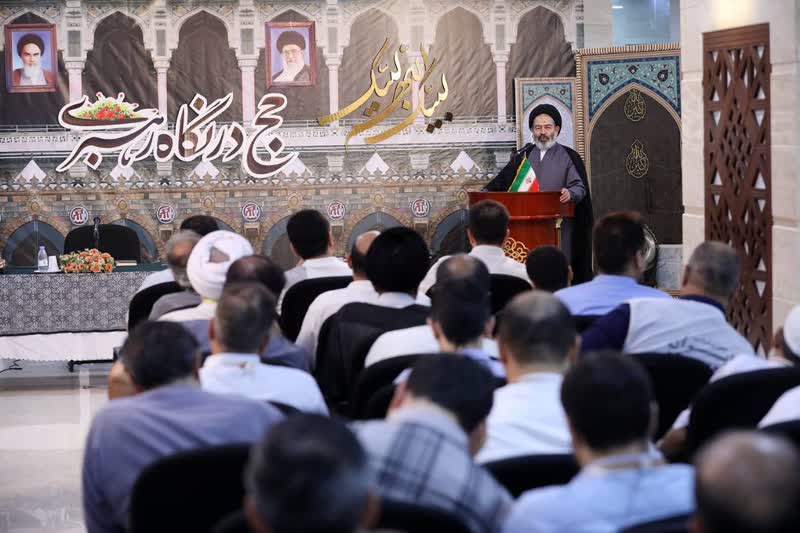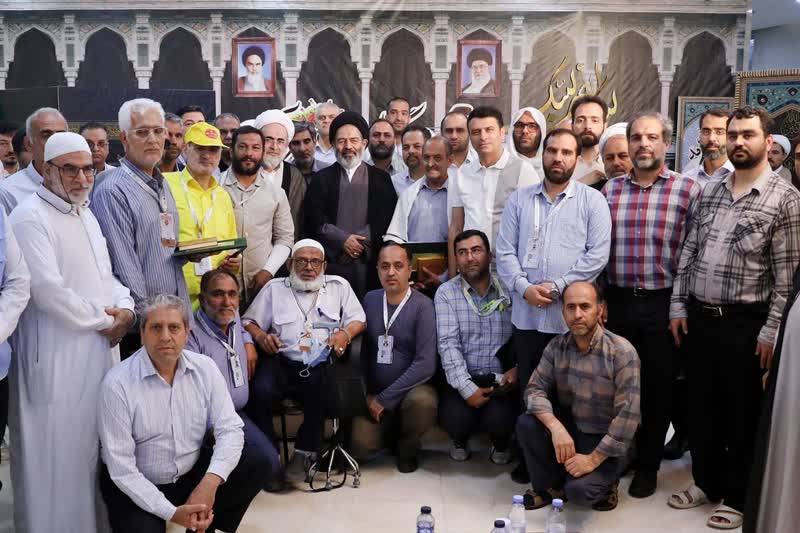Supreme Leader's Representative for Hajj and Pilgrimage Affairs: Prophet Abraham (PBUH) Is Pioneer of Abstinence From Polytheism and Polytheists
According to the Hajj Information Base, another session titled 'Hajj from the Leader's Perspective' that examines and explains the Supreme Leader's thoughts on Hajj was held in Mecca with the presence of Hojjat al-Islam Seyed Abdolfattah Navvab, the Supreme Leader's representative for Hajj and pilgrimage affairs and the head of Iranian pilgrims, and a group of university professors, experts, and researchers.
At the beginning of this session, after the welcome and explanation by Hojjat al-Islam Rukn al-Dini, the cultural deputy of the Supreme Leader's delegation, that these sessions are held with the efforts of this deputy, Dr. Ali Abedi, a university professor, Ahmad Rasouli, a doctoral student in international relations at the Islamic Azad University, Central Tehran Branch, Dr. Seyyed Azizollah Hosseini, and Dr. Gholamreza Esm Hosseini, presented their articles, which are recognized as the best articles in this field in the men's section.
Before this session, the same session was also held with the presence of educated women.
After listening to a selection of articles by their authors, Hojjat al-Islam Navvab, referring to numerous verses from the Holy Quran about the life and character of Prophet Abraham (PBUH), discussed the many lessons that all people, especially the educated, can learn from that great prophet, and said, "When a person reads the verses related to the life of Prophet Abraham (PBUH) and the events of his life, he is amazed that a person in those days could be so far removed from others in terms of spirituality that he could act with such great strategies."
He discussed the two ways in which Prophet Abraham (PBUH) dealt with the people of his time, and referring to the story of Prophet Abraham's arguments against those who asked about the stars, moon, and sun, he said that with "reasoning", Prophet Abraham (PBUH) showed the star, moon, and sun worshipers that this god of theirs was not a real god, and he confronted the "idolaters" with an "axe".
The “logic of identity” in the way Prophet Abraham reasoned with the star worshippers, moon worshippers, and sun worshippers was another point that the representative of the Supreme Leader in matters of Hajj and pilgrimage pointed out. Hojjat al-Islam Navvab said: In this method, Prophet Abraham (PBUH) initially accompanies this group, but then he challenges and invalidates their arguments and methods from within themselves.

He pointed out that after Prophet Abraham (PBUH) wisely and artistically confronted these groups and invalidated their arguments and beliefs, when he saw the ground favorable, that is, when he distanced their hearts from idols, he guided their intellects towards monotheism and invited them to worship the One God.
In another part of his speech, the head of the Iranian pilgrims stated that Prophet Abraham (PBUH) did not only establish Hajj, but also laid many foundations that continue to this day. He said: Abraham (PBUH) was a pioneer in good deeds, a dynamic, active and cheerful personality, and the Quran also mentions him as a nation, which of course he himself was seeking to build.
Hojjat al-Islam Navvab emphasized that based on what the Holy Quran has narrated about Prophet Abraham (PBUH), the civilization-building and community-building outlook can be clearly seen in his words and behavior.
He described Prophet Abraham (PBUH) as a pioneer in I’tikaf and the founder of the matter of sacrifice, and referring to the story of his defense of Prophet Lut (PBUH), he emphasized that defending the oppressed is another tradition that Abraham (PBUH) played a pivotal role in establishing.
The representative of the Supreme Leader in matters of Hajj and pilgrimage also described Prophet Abraham (PBUH) as the pioneer of all kinds of innocence, adding that Abraham (PBUH) was the first person to show hospitality and the first person to migrate for the sake of God, because before him, there was no history of such long migrations for the sake of God.
In listing other founding acts of Abraham (PBUH), Hojjat al-Islam Navvab pointed out that he was the first person to divide the spoils, the first person to make sandals, and the prophet for whom God raised the dead.

In the final part of his speech, he referred to the selected articles, while appreciating the authors and emphasizing the value of these articles, he also provided some points for completing each of them.







